#and my morals are way more important than a US-based show
Text
I sometimes reblog posts about US Americans being weird here, but honestly I don't love how angry or smug most of these posts are. It's just that angry and smug posts tend to get more traction, and so they get reblogged more, and so I tend to see them and reblog them myself. Hm, maybe there's a lesson for all of social media and for me in particular here.
Anyway, what I want out of these posts is not for any US Americans here to feel bad; it's just "funny" and perhaps, perhaps a tiny bit of consideration for how being US American means you experience the internet on easy mode.
This is not your personal fault. Nor is it ethically wrong. It's just a thing that exists, and it may be worth thinking about it.
Examples of that easy mode include:
It's your language. The vast majority of people on the internet need to know a second language to at least participate passively, let alone actively post. It's not just the internet; for e.g. my job, all documentation for all the tools is only in English, and I was required to listen to English lectures and write both my bachelor's and master's thesis in English, my second language, to pass. That's why e.g. posts about bilingualism tend to cause a bit of a discussion, because knowing a second language isn't a special skill but a necessary survival tool.
It is your world-wide culture. The list of most popular video games, TV shows, movies and songs tend to be fairly similar across the world (in particular the part of it we call it the western world, another discussion that I'll get into below), and they're dominated by the output of US media. There is no equivalent to e.g. Disney anywhere outside of the US.
It's your debates and discussions. Because of the huge importance the US has economically and culturally (not to mention militarily), we tend to discuss US topics a lot, and we tend to discuss them from an American point of view.
This introduces American oddities into a lot of the world. For example, I'm a STEM guy, I have a STEM education, a STEM job and my primary hobbies are also STEM based, so what I notice are imperial measurements like feet and inches. Those are not "one of two equally valid choices", they're the unique hobby of the English-speaking countries, and within them, increasingly only the US. But we still tend to see them here as if they were a normal usual thing, and often europeans (including me) feel compelled to provide translations into these units.
But it's not limited to that, court room dramas are another example where courts in the English-speaking world tend to work very differently from those in the rest of the world. E.g. there's no pleading guilty or innocent in most of the world. There are boundless more examples of that, and these things can be grating every once in a while.
As I said before, I don't think there's any moral value here either way. You're not wrong for being an American (but you're also not better because of it). As I hinted at before, I'm still in a very privileged position myself, being from a wealthy European country, and my culture even without Disney is still far closer to that of the US than it is to most of the rest of the world. I'm sitting in the very same glass house, just maybe a different corner (TODO fix this metaphor before posting).
For example, I'm talking about court rooms and inches versus meters, but if we're thinking about history and ethics, there's deep issues in both of them. When it comes to measurements, it's ultimately the question of whether you use the measurements of London or those of Paris. For most of the world it's a colonial imposition either way. You can make arguments for why one is better for technology than the other (and as you can probably guess, I have strong opinions here), but in the grand scheme of things, neither of them is more "ethical" or more "universal", not really anyway. Same with the way legal systems work, where again, countries either adopted (and more often than not were forced to adopt) either the English system or the French system (with quite a few countries choosing to adopt the German version of the French system as well).
I know that's a boring digression but it's something that's usually missing from these posts, especially ones written by europeans, including some I've written myself. I don't really have a conclusion to any of this either, except perhaps that this is something that's worth being aware of.
29 notes
·
View notes
Text
PSA: Next steps of this blog
My hard drive is not working and I haven’t had time to download all the things I had saved of Eddie, so right now some of the bts of this season are gone.
Also, I don’t have the time nor the patience to update the scenes as I’m travelling for the next two months, so it is possible that the next episodes will be updated when I feel like it (if at all 🫶🏻).
#I know I already gave a heads up before the season started but this is the confirmation#I used to at least enjoy watching Eddie’s face and Chris’ scenes but they are non existent right now and Ryan has to work with awful people#and my morals are way more important than a US-based show#I’ll some things I have as drafts and then just post whatever I like#sorry#it’s been a blast meeting some of you and helping people understand Eddie’s character#I hope he gets the storylines and love he deserves#it has been an honour being part of the good side of this fandom 🫶🏻
10 notes
·
View notes
Text
Currently getting my socks clean blown off by Rethinking Narcissism, by Dr. Craig Malkin. Which I found, in a roundabout way, from this video on Midsommar, grief, and narcissism.
Tonight I woke up from a nap and accidentally took my morning meds, so I'm going to be up for a few hours because of the meth. In place of sleep, I'll try to roughly sum up some basic ideas proposed by the research the book is based on:
That traits of "narcissism" like entitlement, grandiosity, and feeling special are not inherently toxic. There are times and places they are appropriate and beneficial. If you show up at a hospital with a gunshot wound to the chest, you should not sit and wait to be seen after people with earaches and coughs.
(Actually, medical systems are designed to prioritize people with more urgent needs, and you qualify under that system. You are special and are deserving of different treatment than those others, which is why making your needs known, even insisting on it if you're not listened to appropriately the first time, is an extremely good idea. It keeps you from bleeding to death on the floor, and keeps the hospital from getting its pants sued off by your heirs.)
It is more useful to view "narcissism" not as an inherent immutable personality trait, but as a cluster of coping mechanisms. As previously stated, there are times they are exactly the right coping mechanism for the job. However, people we call "narcissists" tend to cling to these ones even when they become detrimental to themselves and others, often because they lack other ways of regulating their emotions and getting their needs met.
And that is something they can change, if a person is willing to put in sincere and difficult work. It is not usually fast change; it's a matter of years, not weeks. But a skillbuilding approach turned Borderline Personality Disorder from an immutable curse to a fully treatable (though not quickly treatable) condition, and there's a lot of hope that it can do the same for Narcissistic Personality Disorder.
Meanwhile, there's an opposite end to the narcissism spectrum, and it is also pathological and destructive to hang out there all the time. It's an aversion, or even a resistance, to expecting yourself or other people to treat your own feelings, thoughts, ideas, needs, or preferences as important. For Greek mythology reasons, its proposed name is Echoism.
Unfortunately, because most of the damage echoism does is, by its very nature, localized to its sufferer and their own personal relationships, its downsides aren't often talked about. In fact, it's often seen as an ideal moral state, a kind of altruism or saintliness everyone should strive for. As a pathological coping mechanism a person is trapped in, though, it's often more a fear-based reflex than a conscious and deliberate attempt to achieve some real and specific good. It's not actually as beneficial as being able to recognize your needs, desires, positive aspects, and areas of competence or excellence, and bring them forward in your relationships with other people and yourself.
To me this has all been a cross between a gut-punch and a cool, sweet drink of water. There have been other ways to describe echoism over the years, but this feels like the most concise and useful one I've seen in ages.
It specifically puts its pin down in the middle of the moral debate a lot of people struggle with—"What right do I have to put myself forward? What hope do I have of being seen and accepted? Isn't it better not to burden anybody else?"—and says that the problem is not feeling in touch with either side of the equation, but specifically, the inability to move from one part of the spectrum to another when it's merited by circumstances.
When I was a child, I thought Echoism was the answer. It was my ideal. I thought it was what would get me the love and acceptance I wanted, and would keep me safe from the pain of rejection or not being understood. I had no idea it would actually, in fact, be the primary cause of alienation and loneliness for the rest of my life.
Now I'm so deeply thankful I couldn't fully achieve it, in practical terms. As hard as I tried to erase myself, there were always things I loved too much to suppress. I still found ways to express and discover myself in the books I read, the stories I wrote, the intellectual work of school and the experience of pursuing hobbies I loved, my ambitions to be helpful even when they demanded I stop being selfless, and the relationships where I felt safe enough to experience love and acceptance even if I didn't think I deserved them.
There's this question I found a while back that echoed in my bones: Who am I allowed to be around you? Because that's what I felt like, as a child. If I wanted to engage with other people and minimize my risk of harm, it was my job to bend into a pretzel and fit the shape they wanted. And thank god, thank god, thank god, I couldn't fully do it. Despite everything, there were parts of me too strong and bright to lop off completely to get my arms and legs inside the carriage. I was able to take care of myself and let them grow in secret until I found social places I could let them out again. Despite myself, I found ways to grow and thrive, well beyond the trauma that said I shouldn't have.
1K notes
·
View notes
Text
A lovely group of people encouraged me to post this so fuck it !!
This is going to be a long post, bear with me, but I have a lot to get off my chest about Angeal. I’m starting with how people’s vitriol towards his character completely glosses over the trauma he endured within the game alone.
I understand that Crisis Core is a flawed game where characters like Genesis, Angeal, and even Zack didn’t translate on screen as well as they could have due to areas of weak writing and the context lost during localization into English. But at the same time, there are aspects of the game—background details—that shed light on why characters act the way they do and this is especially true in Angeal’s case.
Angeal is a character shaped not only by his upbringing in poverty, but also by the heavy emotional burden of depression and the disillusionment that follows his discovery of his origins. His actions might seem erratic or morally ambiguous on the surface, but they’re rooted in his mentality shaped by poverty, the ideals he built to survive it, and the eventual crumbling of those ideals.
When someone is raised poor—in Angeal's case, poor enough where it's implied that they didn't have enough to eat—they grow up with a scarcity mindset that comes with a sense of hyper-responsibility veered towards survival.
We know his father passed from exhaustion, working hard to pay off the Buster Sword, so we get the sense that him witnessing his parents work hard made him internalize the notion that he must work hard both to survive and to uphold honor at any cost.
Angeal’s preoccupation with the concept of honor is a direct reflection of his upbringing. Based on Gillian telling Zack in Banora that the Buster Sword represents their family’s honor, we understand that Angeal grew up being taught to value it. Without material wealth or privilege, Angeal built his identity around his ideals. He frequently reminds Zack that honor is the defining trait of a SOLDIER, showing how he clings to this concept to give his life meaning beyond his origins.
Growing up poor not only teaches you that you are undeserving of basic necessities, but it would teach Angeal to value stability and resources, no matter the moral compromises required to secure them.
The opportunity to join SOLDIER and work for Shinra would've represented a way out of poverty. Shinra offered him a stable future and the means to provide for his mother (maybe even his father, though as I'm writing this, when Angeal's father died hasn't been revealed in the canon timeline. It's very possible that he also saw it as a way to provide and care for his sick father).
Using SOLDIER as a means to escape poverty—despite Hollander’s probable influence, let's be honest—likely became an underlying reason why Angeal didn’t abandon Shinra outright. In his mind, letting go of SOLDIER would mean letting things fall apart—losing resources, security, and a sense of control, which he was already losing with the desertion, the Genesis war, and the degradation.
This mindset also explains Angeal’s relationship with the sword his father gave him, as the Buster Sword represents the culmination of his ideals: hard work, honor, and the tools necessary for survival. But Angeal refuses to use the Buster Sword for fear of causing wear, tear, and rust.
Seeing his father lose his life over the sword, he resolved not to use it unless absolutely necessary, saving his resources until truly needed. It’s not that he’s stingy or nonsensical—this is textbook behavior for someone raised in poverty. He doesn’t want to waste or use up what’s valuable, especially knowing that his father died for it.
He's hyper-aware of his role in supporting others, and we can see this by his deep sense of responsibility toward Zack, like how he saved him in Wutai using the Buster Sword. When he says "You’re a little more important than my sword" I like to think that he means that, above all, he values the people he cares about.
However, the same ideals create tension within him the moment they crumble following his desertion. Not only his sense of honor, but as he learns the truth, his sense of self-worth begins to deteriorate and thus begins the downward spiral of not knowing how to reconcile his nature as a "monster" in his words, with being SOLDIER.
Angeal’s depression is evident throughout Crisis Core, and the degradation of the Jenova cells mirrors the psychological and emotional degradation he experiences (literal implications aside).
The closer he gets to losing his body, the more he loses his sense of purpose and identity, not to mention how the honor he had built his life around was spoiled the minute the people who taught him that were his father, who turned out not to be his biological father at all, and his mother, who lied to him. His entire life. He starved for nothing and lost his father twice.
The depression Angeal experiences is compounded by the trauma of discovering the truth about his birth. Learning that he was created as part of Shinra's experiments, that his mother was complicit in these experiments, and that he is no more than a weapon for corporate interests leaves him rightfully betrayed. In fact, his reaction was tame in comparison to Genesis and Sephiroth.
His mother’s suicide further deepens his trauma and gives us the first major evidence of his suicidal ideation and severely unwell mental state: "My mother did not deserve to live, and neither does her son," which he says instead of explaining what happened/defending himself after Zack assumed he killed her.
This belief that he is unworthy of life stems directly from the revelation that his life was never truly his own but an engineered existence meant to serve Shinra's greed. This statement epitomizes his suicidal ideation, a declaration that he too is undeserving of life, both because of the role he played in perpetuating Shinra’s horrors and the labelling himself as a monster undeserving of life, an unnatural thing that needs to be purged from existence.
I can’t even begin to describe the magnitude of the revelation that the man whose ideals he built his life around, whom he believed was his father, isn’t his father at all but instead Hollander is, who his mother worked with to orchestrate everything that’s happening to him now
Mothers are a central theme in FF7’s world, with Jenova/Lucrecia being at the center of that and their actions’ influence over Sephiroth, but there’s also Cloud grieving his mother’s death at the hands of Sephiroth, Tifa believing that she would see her mother again if she climbed Mt. Nibel, Aerith watching Ifalna die and then being adopted by Elmyra, and so on.
Gillian, from what we can tell, was loving and raised Angeal with care. She likely kissed him to bed each night, comforted and nurtured him in the way a devoted mother would. But the revelation of her involvement in the Jenova Project shattered everything Angeal believed about her. In Angeal's words, her "shame" became unbearable, and he saw her once nurturing presence as a facade hiding deeper lies. Her decision to take her own life after he confronted her about it added to Angeal’s trauma, reinforcing the belief that everything he held dear was built on deception.
I like to think that there was a part of Angeal that carried the guilt of Genesis’ degradation. Maybe he thought that if he hadn’t come between them in the training room, Genesis would’ve been fine—(which I don’t think so. I think there’s a high chance Genesis would’ve gotten hurt either way and that would’ve triggered the degradation).
This is a topic for another time, but I don't think any singular person was to blame for the incident in the training room. They're all equally to blame without it being their fault, because none of them asked to be a part of the Jenova Project. It's ultimately Shinra's fault.
Angeal probably struggled with depression even before the events of Crisis Core. Poverty itself is a destructive force that can cause lasting psychological damage. It has a significant impact on mental health, just like how growing up under Hojo’s abuse and being controlled by Shinra had its effects on Sephiroth. It can and does lead to depression due to the mental, emotional, and often physical (hello, Angeal's father) exhaustion it causes. Even when someone escapes the instability, it still stays with you because by then, you've learned to live in a world that taught you that you didn't deserve to live in it unless you work hard.
And now Angeal doesn't want to live in it for other reasons.
Another thing @ilminnestrone pointed out to me (who, btw, huge shout out for beta’ing this post <3 ), is how his mental state was influenced by the culture of toxic masculinity within the military/ SOLDIER. Just like in the real world, the military environment at Shinra likely placed a heavy emphasis on masculinity, strength, stoicism, and left little to no room for vulnerability lest the operative in question was deemed weak and not at all befitting of the shallow profile of a hero Shinra capitalized on.
In environments like these, Angeal is expected to always be in control, to suppress any emotional or mental struggles, and to uphold an image of unshakable resilience, especially when he was canonically considered to be the spiritual leader of SOLDIER.
This expectation of constant strength absolutely exacerbated whatever pre-existing struggle he had going on—circling back to how being raised in poverty has long lasting effects on mental health. Rather than being able to openly process his feelings about his degradation, his mother’s betrayal, Hollander being his real father, or where he fit in this new reality of his, he was still trapped in a role that demanded he shoulder everything in silence.
Keep in mind that in a culture where admitting weakness is often seen as failure, Angeal’s (and Genesis’) deterioration would’ve been magnified tenfold by the toxic expectation that they maintain an appearance of unwavering strength.
This combined with the rigid ideals Angeal built around honor and the nature of his job must’ve weighed on him for years. The mutation only exacerbated potential doubts that were already there.
Angeal's actions in the narrative are not those of a clear-cut hero or villain. Instead he occupies an in-between space where his moral compass, traumatic experiences and actions inspired by his headspace constantly clash, which is what leads to his label as a hypocrite.
His decision to defect from Shinra and join Genesis is not a simple act of betrayal but rather the result of his overwhelming internal conflict. On the one hand, he wants to get through to Genesis and help him, he's aware that Shinra has betrayed them, but on the other hand, his ingrained sense of duty and loyalty makes it difficult for him to fully break away from the organization and responsibilities he has like, for example, Zack.
He wants to do good but knows that his conception was not a product of good intentions. In his mind he's a monster being pulled in different directions at once. If anything, this is most realistic reaction to what he’s going through in the game.
His behavior becomes erratic as he oscillates between opposing forces—one where he remains loyal to the values he once cherished, and another where he acknowledges the harsh truth— struggling to reconcile his identity as an honorable SOLDIER with a science experiment.
This moral ambivalence is a symptom of his deeper trauma, as he tries to cling to the remnants of his previous beliefs, which is why he’s still enforcing having dreams and honor despite his actions.
Some dialogue from the game where Angeal acknowledges his headspace:
Angeal: I need your help
Zack: Do you?
Angeal:
Zack: Honestly, what are you thinking Angeal?
Angeal: I'm not really sure myself. At times I feel as if my mind is mired in fog.
The scene where he sprouts his wing and jokes about being after world domination is another key glimpse into his mindset. At this point, the joke isn’t entirely a joke—it’s a reflection of his resignation to the role the degradation has cast him in. The line about a monster’s objective being world domination is a bitter acceptance of the fact that, in his mind, he has no choice but to fulfill the destiny that was engineered for him.
He feels trapped. And yet when Zack compares him to an angel, his response is: "Then what should an angel fight for Zack? What do angels dream of?! Angels dream of one thing... To be human."
He wants the cure and the normalcy so badly, but in his mind, the "monstrosity" is something that sets him apart from humanity and a reminder that he is different, degraded, and no longer the man he once believed himself to be.
Angeal's ultimate decision to force Zack to kill him is the culmination of his depression and his struggle to reconcile his identity. He believes that his continued existence is something that needs to be purged, something that poses a danger to those around him, something that shouldn't have existed in the first place.
He wants to pass on the ideals of honor that he once held so dear, even if he feels unworthy of them himself. In his mind, the only way to regain some form of dignity is to die by the hand of someone who still embodies the values he once believed in.
Zack as his student represents the purity of those ideals—untainted by the knowledge of Shinra's experiments and degradation. By having Zack end his life, Angeal seeks not only an escape from his torment but also a way to pass on his legacy to Zack.
His final words: "Protect your honor, always."
Angeal made his dreams clear earlier when he said that an angel's dream is to be human. When he dies, passing the Buster Sword to Zack is not only a way to protect his honor but also a fulfillment of that dream. At that moment, there's nothing more human than dying at the hands of someone else, rather than succumbing to degradation.
This act, while devastating (and yes, extremely traumatic for Zack), is consistent with the psychological profile of someone who has suffered long-term trauma, depression, and suicidal ideation.
Might be controversial but at this point in the rant fuck it: Condemning Angeal’s choices shifts all the sympathy onto others while entirely overlooking the immense suffering he was enduring. People often focus on how his actions impact those around him—Zack, Sephiroth, and others—without ever considering what Angeal himself is going through. All the above mentioned, the shame, the suicidal thoughts brought on by the degradation and his subsequent actions to purge himself from existence, they’re all pushed aside in favor of examining how others are affected. Everyone was affected, yes, and Zack deserves all the sympathy in the world for what he was made to endure in Crisis Core.
But I feel like this erases Angeal’s pain and frames his ultimate decision as a betrayal rather than a desperate act of self-sacrifice driven by his own emotional struggles.
"Oh, but Angeal was a terrible friend, Angeal was a bad mentor, Angeal was a hypocrite." Here’s the thing: If you’re someone who sympathizes with Sephiroth for having a traumatic past that led to a mental breakdown and burning Nibelheim, if you understand Genesis’ destructive actions as a response to degradation, then you can sympathize with Angeal for his turmoil and his position in Crisis Core.
Angeal’s spiral is rooted in a lifetime of hardship—from growing up in poverty to confronting the existential dread of his degradation. He wasn’t just a man falling apart. He was someone trying to uphold the honor he cherished, even as his world and his sense of self crumbled around him and forced that honor he held so dear became hollow.
His actions make sense within the context of his mental state.
I'll end this by saying that this isn't a rant to defend his actions, but rather to defend the mental health aspect that may go overlooked when discussing Angeal, which is such an integral part of his character.
#ok ok back to my usual stuff#i just want you all to know that I'm terrified of posting this fffffff#ff7#ffvii#final fantasy 7#angeal hewley#final fantasy vii#crisis core
191 notes
·
View notes
Text
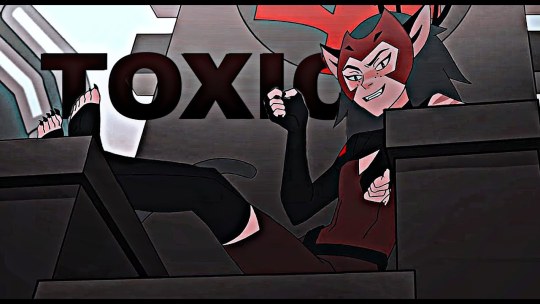
Catradora and Stolitz: Same Toxic Ship just Different Genders
This series has always felt like the Catra Show, and so much so that even Hordak never felt like the main villain. And nothing drove that point home more than season five proving once and for all that this series' moral line(or lack thereof) is really about a Villain Protagonist when the character that increasingly became a monster for four seasons still got everything she wanted in the end.
Catra is the poster child for the moral bankruptcy of this series.
I can't buy her ''redemption,'' or her relationship with Adora, because she went too far.
Therefore nor can I buy the mental gymnastics that arise when she is the topic of discussion in the fandom.
For four seasons I watched this character willingly and gleefully jump rope with the moral event horizon. Then she finally broke it to the pieces when she genocides the planet, and everyone on it, because of her sick, evil, obsession with being better than Adora.
Loved all this time my behind.
Catra was a vile person from her introduction, and just got increasingly more poisonous as the show went on.
Season Five wants us to treat Catra like she was just a bad friend.
She just said a few mean words here and there, and therefore all she has to do is sincerely apologize then friendship can begin again.
Here's the thing Catra wasn't just a bad friend she was an abuser and a fascist.
She had multiple opportunities to leave the horde, and had no reason to stay in the first place, gleefully attacks the resistance, is the reason Angela died, tried straight up multiple times to end Adora’s and her friends lives, and was just an abomination to even the ones on her side etc..
On the flip side we have Adora who doesn’t give a damn about Catra for four seasons. She’s too busy enjoying life with her real friends.
Try and recall, was there ever a moment where Adora was...concerned for Catra’s safety? Pining for her in any way romantically? Ever? Even once during the first four seasons? Because I don’t.
Honestly, Catra wasn’t important to Adora until Catra showed up on screen. And then they both wanted to kill each other. Any moments of Adora thinking about Catra it was in the context of Catra being her enemy.
But I'm supposed to believe in their romance based on what? Catra's toxicity? Adora's nonexistent romantic feelings for pretty much the entire series?
It seems in season 5 all Catra had to do was one act of atonement and out of nowhere, like Adora has been possessed by the ghost of Queer Rep, she suddenly can’t get Catra out of her head.
Also, note that Catra didn't save Glimmer because she realized her past actions were evil; no it was all for Adora's sake i.e. the person she is toxically obsessed with.
Furthermore, the redemption in question is handled with the most condescending of kid gloves.
It seems like she was replaced by a clone for season five. She’s just accepted.
It's like seasons 1-4 didn't happen. The forgiveness was excessive and forced so we could be okay with this abuser/war criminal being chummy and romantic with her victims.
For example, Glimmer cries over her, kisses her cheek, etc... Yet Catra is responsible for her mother's death, the world ending, trying to kill her, war crimes against Bright Moon, etc.
Then Entrapta also forgives Catra like it’s nothing even though she sent her to die, and apparently, she was in this hell space for a year.
But everything is supposed to be wonderful because an abuser ends the series romantically involved with her victim?
When Adora said you made your choice and now live with it that should have been the end of any reconciliation either platonic or romantic.
Even her flashbacks are of her being abusive.
You see her in one of them( in her so-called redemption season at that) scratching Adora's face to the point it left blood, and jumping on her stomach just because Adora dared to be friends with other people.
This was pretty much every childhood flashback they showed.
She would emotionally and physically abuse Adora, and then Adora would take her back.
This would continue even as young adults. It was a pattern(red flag) that Adora unfortunately didn't escape.
But.....I always loved you,says Catra.
For Adora's own mental health/closure, she could forgive, but only if she also makes it clear that she doesn't want her abuser/ex-friend back in her life.
I could have tolerated that ending instead of Adora becoming a couple with her abuser.
Basically, this Villain Sue ends the show getting everything she wants even after manipulation of several characters, genocide, war crimes against her own people, physical and mental abuse(especially toward Adora), repeated attempts at murder, and just being a complete psychopath to anyone within spitting distance of her toxicity.
She gets to be pretty much abusive scum for four seasons, on top of actually doing the same thing Prime wanted to do, yet whiplash forgiveness and Lesbians 4 Evah is her ending.
"So we're all just okay with this?", says Mermista incredulously of the war criminal Hordak. Good question, but then I remember you all seem to be okay with war criminal Catra sooo.....
Her mirror Hordak, according to the showrunner, is sentenced to Beast Island for his war crimes. However, my question then becomes where is Catra's sentence? Oh, that's right if you're Catra you get to be a war criminal in peace, and especially if you're dating the protagonist.
It's also convenient that Mermista's was chipped, and therefore didn't get to say anything to the girl who helped bring down her kingdom with a smile on her face.
Funny how that worked out.
It's even more convenient that her victims gave their lighting fast forgiveness.
Can't have icky things like abuse and war crimes get in the way of that ending smooch you know.
I suppose we also just need to look at Angella as collateral damage while we smile as her daughter hugs and kisses her killer I guess.
I also find it odd(since we're loving abusers) that Shadow Weaver point blank doesn't get forgiveness from Adora, and she even ends the series dead.
However, she defected to the hero's side in season two(regardless of any impure motivation), and stayed there and helped the protagonists until her season five death.
But Catra, who not only stayed with the conquering organization the Horde for almost the entire series while also eventually becoming their leader, was not only forgiven but also rewarded with a romance with her victim. Curious.
The only way I can stomach her season five 'redemption', and lighting quick forgiveness, is if I forget the monster of four seasons didn't exist.
Problem is I can't do that.
Why should I get any catharsis that the protagonists prevailed over Horde Prime when Catra is pretty much him with a sob story attached.
So it seems this show's message is no matter how much emotional and physical pain a person does to you it's okay to not only let them back in your life(damn your mental health I guess), but also enter a romantic relationship with them too.
It’s also hilarious that some of her fans say she’s Zuko.
No.
She’s what would happen if Azula and Kylo Ren were made into one character.
Titles the show should I have had:
She-Ra: The Story of a Villain Sue Antagonist That Gets a Happily Ever After With Her Victim
Another alternate: She-Ra: The Story of Lesbian Reylo or more current Lesbian Stolitz.
115 notes
·
View notes
Text
YEHAW DA:V REVEAL THOUGHTS BELOW!!
Overall: Feeling so excited for this game. I'm climbing up the walls. I can't believe that was 20 minutes, it felt like 10. Need this in my hands yesterday.
What I liked:
-Holy fuck wow wow wow the hair looks like nothing I've seen in a video game before.
-Combat seems very different but also a natural progression of gameplay past. Real-time turn-based was always a little on the clunkier side, and while it never really bothered me, moving towards something more ME-style was expected. Very excited about being able to aim a bow. Would like to know what difficulty they were showcasing bc I'm considering jumping right into a Nightmare run.
-Now that I've been soulsborne-pilled the prospect of a parry mechanic has me buzzing.
-I feel like people are gonna dunk on the "stiffer" animation, but I prefer it so much more than the BG3/HZD constant wobbling. It'll make the key performances stand out instead of mostly jangling keys in front of a baby and letting the big moments get lost in the sauce. (Not that the aformentioned games didn't have good animation, just. If your characters don't need to move their whole body to convey dialogue I'd prefer if they didn't.)
-The sublety in the facial animations is CRAZY.
-The roleplay dialogue seems really reactive!! And the cuts to inject the unique dialogues feels smooth. I'm sure there will still be moments where it's easy to tell, but still cool. Seems like they're gonna be paying more attention to your personality type like DA2 too.
-So excited about Harding and Neve as companions and can't wait to meet everyone else.
-Neve's staff/wand makes me excited to see what kinds of focus options we'll get as a mage AAAA.
-God the costumes have so much swag. One of my hottest of many BG3 takes was that the costumes were overall flavorless. (Really hoping they didn't change the Grey Warden uniforms though that would really disappoint me.)
-Cinematography looks fantastic. Lots of well set up shots.
-NGL I felt something when Solas showed up. Wasn't expecting that. And while not perfect, I liked his interaction with Varric. Their relationship from Inquisition really slips under the radar if you're not bothering to look.
-Varric has never gotten over the trauma of what happened with Anders and it breaks my heart in a good way. God you could see it in his eyes!! [chef's kiss]
-However, I definitely have to kill Solas now for what transpired in this preview.
What I'm iffy about:
-The voice peformances feel a bit stilted. Not really what I'm used to from Bioware and I feel like it's important when the animations are more subdued. Hopefully this feeling will change when I get more of the game.
-The dialogue also felt a bit dumbed down. "Solas is doing his ritual!" "Yes. Solas' ritual. The ritual that we have to stop." Again, hopefully this is symptomatic of a tutorial level/trying to onboard newbies quickly and not the whole game lol. While I prefer this to dialogue that tries to sound smarter than it is, I'm really hoping we see an overall improvement from Inquisition.
-Sort of wish they went with the Andromeda dialogue system instead of bringing back Inquisition's, but I do like that it seems all dialogue options are getting tonal indicators again and they're not as easily conflated with morality. (Though I imagine people will STILL interpret it that way.)
-A little confused about them introducting Minrathous' panopticon shit and then immediately swerving into Solas' ritual. Would have liked some breathing room on that kind of worldbuilding.
- While I'm generally open minded about the change, I Do Not Love not being able to switch to playing companions. Might turn around on this if your ability to issue them commands opens up the closer you are to them/the more you grow into a leadership role. I do like that it seems you will eventually be able to command when they use abilities a la OG Mass Effect bc that was my biggest beef with the Andromeda gameplay, esp on Nightmare/Insanity difficulty.
-Not crazy about the new Pride demon design where are their leggies.
-Not really a Criticism, but they are definitely setting up for Varric to die and while I get it, narratively, I'm NOT HAPPY. Dragon Age has been almost allergic to scripted deaths so it's also gonna feel like being dunked in an ice bath. EVIL STUFF. IN DENIAL.
132 notes
·
View notes
Text
Why is what Elain wants the most important thing?
It's always used against Elucien's, how one side of the fandom claims moral superiority and that they care more for Elain because they ship her with Az since Elain wanted to kiss Az (she wanted Graysen to take her back too but that doesn't seem to matter to them), that Sarah is a feminist author therefore what a female wants is more important than what the male wants.
I love Elain, she is my favorite, but she's not the most important character left in the ACOTAR series. So why would her choice be more important than Vassa's choice or Gwyn's choice?
We KNOW there will be more books which means a female other than Elain is getting a POV. Some say the book after Elain's will feature Lucien and Vassa because Lucien is comfortable around Vassa but based on the arguments being tossed around shouldn't Vassa's wants be more important than Lucien's comfort? Where does the text support Vassa wanting anything romantic from Lucien?
They'll claim Lucien with Elain gives off "guy friend pining for female and not taking the hint" vibes but Lucien and Vassa are actual friends. They'll say with the utmost confidence that despite Lucien longing for Elain on Solstice in SF he does want to be with Vassa yet we have no evidence of Vassa showing interest in Lucien in that way so how is that not the exact same thing? Yet they push that ship with the force of a wrecking ball.
I don't think Lucien wants to be with Vassa at all but if that's the argument they're using than why would it even matter what Lucien wants since to them it's about what the female wants? Suddenly with the Vassien ship they care about what happens to Lucien, that his "feelings" for Vassa matter despite her lack of romantic feelings for him.
Elain's wants are the most important thing when it comes to E/riel. Lucien's wants are the most important thing when it comes to Vassien. What selective feminism.
Also, what if we find out in the next book Gwyn does want Az even if it's Elain's book? It's a pretty big deal she felt comfortable alone with him after what happened to her. It's a pretty big deal she started playfully calling him "Shadowsinger" and wanted to wipe the smirk off his face especially. There is way more textual evidence to suggest Gwyn might have an interest in Az than Vassa does Lucien.
Based on the argument, why does it matter if Az wants Gwyn right now when it's about what the female wants and why should one female's wants trump that of another?
I realize my points are all a bit ridiculous because these characters don't want anything that Sarah doesn't decide for them and the pairings will work out as she wants them to regardless of what anything looks like at this stage in the game. Really the point is just that the cries of feminism are very performative, where it only matters so long as their ship happens, where it only applies to the female they like best.
56 notes
·
View notes
Text
Symbolism my friends.... symbolism tells me of protag Mr Puzzles
let's look at it a bit....... differently
the first 5 specials we saw, they symbolised something completely different
when 4 appeared, he was always a protag or a coprotag
and well... almost like future foreshadowing, the antagonist in Once Upon an SMG4, which once again, even outside of that, full of beautiful beautiful symbolism, something that could even...... show us where we are heading
I might be a crazy 3 liker, and you have to bare that in mind as you take a ride in my land of imagination........... where I show you a beautiful world I wish would come to life in the actual SMG4 as well
so... you see.... 4 was the antagonist in the PV special this time, similarly to, as I said above, Once Upon an SMG4
where 3 was the protag
and now another one where 4 is an antagonist (I'm not saying villain on purpose here, because they both count as villains in a sense but storytelling wise, as it stands in a vacuum in this episode, it would only be SMG4 although some of you will definitely argue against me on that)
and with Puzzles as the protagonist
and you can consider that hey! Puzzles had been getting.... a lot of attention
you know who else had been getting a lot of attention that people got tired of but probably forgot they got tired of it at this point? SMG3
Do you see where I'm going with this? I think they should team up. Idk if they will but it would maybe make sense
saying maybe because depends when
I still see the plot twist protag thing with Puzzles where he sees that SMG4 is far too gone and a lot more worse than what Puzzles would've expected
you know who else should show up then? SMG3
think about it, what was one of the things 4 mentioned in MEME HUNTERS, also an..... all capital episode (which I mentioned before that after You Used to be Cool the only episodes besides the movie that had all capitals were the episodes where the café failing was mentioned in some way. this makes CEO OF RIZZ important btw "but that doesn't mention it" he was literally shilling out for Boopkins for more people to go to his café, it literally sounds like the start of it is what I'm saying lol)........
3's café failing
I think even....... 3 would feel responsible for what's going on so he would go against 4 as well to try and get him back to normal.......... with Puzzles on his side :3333 I think it would be real awesome
also I think I need to mention this but this was the first Puzzlesvision Mario wasn't inside of, like as in the movie, I do know we see him fly by in the beginning of the episode itself but he never appears in the episode itself
you know, kind of silly to mention, but the only PV episode so far that didn't have Mario by 4's side was ALSO Once Upon an SMG4
Also, a lot of the points making Puzzles even more fitting to be a protagonist next episode
the parody being of Gru, which I would argue is about a villain slowly redeeming I'll be real. but also keeping the morals
the whole making friends with Leggy thing
the conversation he had with 4 where he offered to Puzzles that he could join, almost like foreshadowing for the future or something :3
"I am your-" you know what I think he would've said? "Father" you say. I say.... creator. Hear me out because when you think about it in a meta level, he absolutely is
the fact that he wielded the Good Jedi light saber in the scene with the cute ass Meggy plushie being the base of it, very villanous of you Puzzles
the fact that he get more feelings then being a maniac, something that is STILL present but now along with the tsundere ass "it's not like I think you're useful or anything" he was so close to saying some stupid shit like that I swear
I saw someone saying it and I'm so stupid for not realising but 3 being a RETIRED villain in this, like yes he literally is and HE IS ALSO working together here with Puzzles JUST LIKE how I WISH HE WOULD NEXT EPISODE PLEASE PLEASE PLEASE PLASEPAPLEPAEPLEAPLAPELPALSDPELEPLEPLAPLDPWLEPDKLKSOKDÉ--
I think these points just come to show even more that he could easily become the protag of this next thing, and reasonably so-
but do tell me what you think :3 or if I'm just yapping lol
51 notes
·
View notes
Text
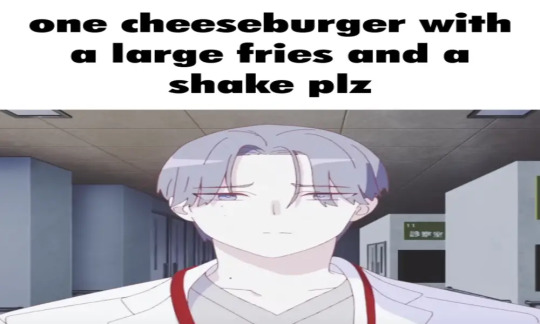
As an honorary Shidou apologist, I am breaking my silence. I’ve finally decided to go on a rant on why I don't think Kirisaki Shidou is an organ harvester.
(fair warning I like absolutely suck ass at organizing my thoughts, so if some of this is incoherent or if it seems like i'm repeating myself my bad 😭 I mainly wrote this for fun)
So, I'm aware that this theory is the most popular consensus when it comes to Shidou (and tbh, I think part of it is because a lot of people kinda look over him? Like at least a tiny bit more than the others, considering a lot of people also don’t realize how his main victim was probably his son and not his wife, but I digress) (plus I think all milgram characters are looked over to a certain extent). While I do think parts of it are probably accurate in some way, I don't think he was a full-on organ harvester (as in he actively stole from patients through illegal means. emphasis on actively) and that the theory in and of itself is flimsy at best. He's morally questionable, yes, but it’s more in the sense that he’s a somewhat apathetic guy who lacked understanding on how his own set of morals and values (i.e. pushing for organ donation) could be seen as wrong. So if he were an organ harvester, wouldn’t he be aware that it’s illegal? That’s what confuses me whenever people bring it up. I don't actually doubt that he may have done something illegal for his family's sake, it’s just that I still highly doubt it was something he actively did. And that seems to be what a lot of people think when they refer to the theory. (if i’m wrong please forgive me, i just assume organ harvester shidou = people think he did it as a job)
Anyways, more under the cut for those interested (it's a bit lengthy my apologies)
It then kinda trickles down to how his guilt stems more from the consequences of his actions rather than the actual action of taking organs. The root of his guilt comes from the realization that basically asking families to pull the plug and use their loved ones' organs for donation is a very, very hard decision; one that he kept pressuring for. If he was an illegal organ harvester, and was aware that his actions were in fact illegal, why the hell would he feel so guilty to the point that he’d start having suicidal ideations? That’s the key difference between his profession and his possible criminal activities; one is a burden both emotionally and morally, the other is more or less a literal burden. And based off of Shidou's character, he seems to be much more emotionally affected. That's also why I think a lot of people jump to the conclusion that his guilt stems from his actual actions rather than their effects. (does that make sense oh lord i am going ☝️🤓 so hard rn)
I get that some parts of his MV or lyrics seem to be suggesting that, but also it’s important to note that Shidou has a very strong bias against himself and definitely painted himself in a negative light. I mean, that's why he thinks every single preceding patient before the final incident is a victim to him, why he shows himself staying professional in a professional setting as apathetic (minus the pressuring part), and why he literally equates his job to STEALING. Not only that but, imo, it's also a little too unrealistic and might not actually fit the criteria of Milgram. Milgram is for crimes that are in a morally grey area. So if it really was organ harvesting, is it really in a grey area? (though I guess you could say that doing it for family's sake would be, but that's only for his family. He'd have no reason to do it otherwise). Plus, it'd make more sense and fit the theme of touching upon social issues (i.e. abortion, bullying, societal standards, mental health, etc.) if shidou’s entire dilemma was in regards to (albeit questionably done) organ donation, a complicated ethical topic in Japan.
Throw Down actually gives a pretty good rough idea of Shidou's thoughts towards his crime and his feelings in regards to it. He felt like he was blinded by his own values, and that inadvertently caused him to be unaware of the suffering he caused through his job. It really does shock me that he somehow was able to pull-off getting a forgiven verdict in T1 because he certainly comes off as cold and uncaring in regards to his work.
I think the final bridge in Throw Down kinda summarizes his entire mindset, actually.
Now slowly close your eye, put your regret on display
Wishing you for someone else's sake
With the same expression no matter who comes
I don’t feel scared because I don’t know
Shidou doesn't quite understand the feelings of his patient's families, and therefore he acts remorseful and sympathetic more than he actually feels. Why? Well, because he didn't know. Up until that point, he never understood the weight of his actions, and focused on his role as a doctor. "This is an upsetting subject, yes, but it's for the greater good, right?” A braindead person has little to no chances of living, so why not use this as an opportunity to donate their organs? Moreover, as a doctor I believe it’s typical to be "emotionally detached” (for lack of a better word) since I’d assume becoming emotionally connected with a patient would make things at least a bit messy.
His mindset comes crumbling down though, presumably because he experienced the same or a similar situation. This part remains muddy for me, since we don't know much about what the actual cause for Shidou's guilt is. There are several possibilities, with the most plausible ones being:
he lost his own family member and had to go through with the same decision,
he tried to save a family member using donated organs, but failed, making it seem like everything he has done as a doctor was in vain
(a secret third option would be him making someone he cares about make that decision but it's very unlikely and also requires too much mental gymnastics)
But no matter what exactly he did, it all trickles down to the validity of his morals. After realizing the pain of losing a loved one, the struggle of trying to save them, and the unfortunate failure which left all efforts practically pointless, Shidou would understand the actual weight of his actions and why all those families were so reluctant to let go of their own.
This is even more evident in his T2 voice drama, Asclepius.
"In order to save the life of someone you don't know, please let me kill your family," I told them. It doesn't even take much thinking to realize how cruel that is, but… I didn't realize it until the very end.
This is the gist of Shidou's crime, or at least part of it (considering he says "Well, about halfway" when Es asks if their judgment was right). Again, this tells us that Shidou's guilt comes from the act of the effects of organ donation rather than the literal action. And this also implies that his "murders" did in fact have to do with being in a medical situation, it's just the way he went about it was at the very least morally questionable.
I will also acknowledge that he says he killed for selfish reasons, which most likely relates to trying to save his own family member. Here he could possibly have actually done something illegal such as tampering with patients or illegally taking their organs (latter is a stretch imo). Plus, his distorted T2 voice trailer line is literally "You're in the way, hurry up and die" which would only make sense in the context of waiting for a patient to die. But it could also just be him continuing to pressure for organ donation, but now with his own selfish motives.
Going back to the "halfway" comment, while I personally believe it might have to do with how Shidou views his crime as more than just taking organs, it more likely implies that something else happened that Shidou would consider murder. That being the actual death of his family member. It's implied through Throw Down that he was trying to save someone but failed, which he was responsible for. Then from there it'd make sense to assume that he would feel some form of guilt for the rest of his patients, either for the reason of failing to actually utilize donated organs even with the opportunity of being able to save them, or for just realizing the what it actually feels like to have to give up on your loved one. (does. does that make any sense.)
So yeah, I don’t think he’s an organ harvester due to what’s known regarding his crime, the reasoning for his guilt, and with the way he is as a character. The most I’d personally believe is that he decided to harvest organs for the sake of his loved one, but even that seems like a stretch to me. Thus, that is why I believe Kirisaki Shidou is not an organ harvester.
Anyways I’ve rambled on long enough, thank you for reading if you did and remember to drink water and vote shidou innocent in trial 3 because i will shit my pants if he doesn't get inno
#milgram#shidou kirisaki#kirisaki shidou#milgram analysis#everyone point and laugh at me for writing so much#i am so terrified i said something wrong like if i did then strike me dead#kirisaki shidou DESTROYED MY LIFE#i love the pathetic failure doctor#i swear on my life he'll get 3 innos no matter what#shidou i am begging you do not pull out some bs that'll make you seem less favorable than you already are#chibi's ramblings
89 notes
·
View notes
Note
Wait that hunter and willow struggle with vulnerabilty essay you mentioned... Hand it over 🫵
KXJSK thank you for enabling my brainrot, let's GO 🫡
okay so, for starters, we all know both hunter and willow tend to hide their vulnerability, push down their feelings and repress a lot, but it's actually super interesting how they do it in completely different ways and for such different reasons.
i've already written one essay about hunter's tendency to do that here, but that was a while ago, so let's refresh it up a little bit with season 3.
hunter lived his entire life in the emperor's coven, as a magicless witch at that, isolated from everyone and manipulated. he got used to ignoring and hiding how he felt, because showing vulnerability in the coven was seen as weakness, and showing his real emotions could have genuinely very very bad consequences for him. especially with him having no magic, he was already disrespected and seen as lesser by everyone (for example, the covenheads) but he yearned to be respected, to be treated well, equally; so he couldn't afford to show any vulnerability there. and when it came to showing negative feelings near belos... well. that especially had the potential to take a dark turn really fast; to provoke belos to do something. it was genuinely dangerous for him to express his emotions, it wasn't safe for him at all. he could NOT do it.
his golden guard persona also comes into play here and it's SO interesting how he uses it. masking (in a literal, psychological AND metaphorical sense); using it to feel braver, to act more confident. taking on a role of the emperor's trusted right-hand man instead of the lonely kid that he was. all this... well, surrounded by that hurtful mentality and hostile coven environment, he had to do it; to be more respected, to be able to do things that he had to do, to actually FUNCTION. it was a necessity for his survival.
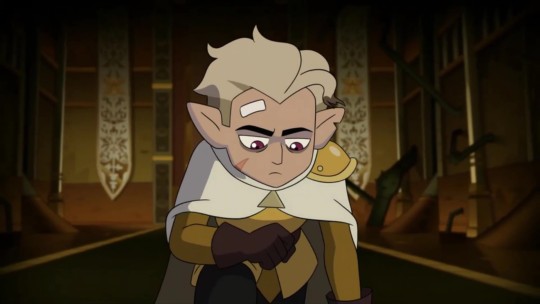
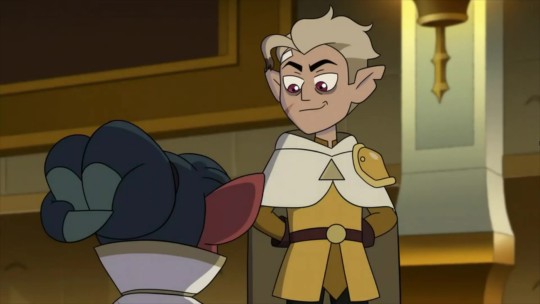
but here's the thing, he likes to think of himself as a more of a practical/logical/rational thinker, and he IS in general, that is true, but he actually DOES act based on his emotions and moral compass quite often. he's also really good at reading and analyzing people, and immediately getting them. he's oblivious to some things but overall he's emotionally smart, and very very insightful and perceptive....... it might be sth he's naturally skilled at, but he also definitely had to learn it; had to know how to read belos' mood and probably learnt all the little things he had to watch out for on some days, all the little signs to stop talking or look away. all that was, once again, for his own safety. BUT OKAYKXJSKK we're accidentally going off course here so let's go back slightly-
hunter is also VERY expressive (which makes sense considering he wore a mask most of the time. ............. also hyper-expressive autism #real #so true—) so oftentimes his emotions are actually (no matter how hard he tries to hide or deny them) well visible on his face, before he manages to school them; although that also depends on the exact emotion he's feeling, some are more visible than others. so this is interesting, how he simultaneously automatically represses/hides some of his feelings and manifests them as something else but also feels everything so intensely and is such an open book based on his initial facial expressions. both of these facts coexist.
so, vulnerability. we already know hunter has trouble expressing his emotions at times. he loves to pretend he's okay when he clearly isn't; and it takes a LOT for him to open up to someone. he only really lets himself be truly emotionally vulnerable next to people he fully trusts and feels safe with, it doesn't come to him with ease.
that's why his scene with luz in the forest shack's basement is so important. that ENTIRE scene, actually. we can really see how much they've grown to trust each other, how safe they feel in each other's presence.
what they had going on with their secret-keeping was not really fully healthy at the time, because they kept comforting each other from their VERY similar perspectives/stances, which just further locked in their mentality of "oh they'll hate both of us when they find out our secrets"; they were ensuring each other's fears by relating to each other; it was a circle. but nevertheless, they still cared about each other and have grown to care about each other even more throughout the few months.
here, hunter managed to admit that he was scared. he felt comfortable enough to admit his vulnerability like that to luz since they've grown closer and truly trusted each other with this. he's grown SO much.
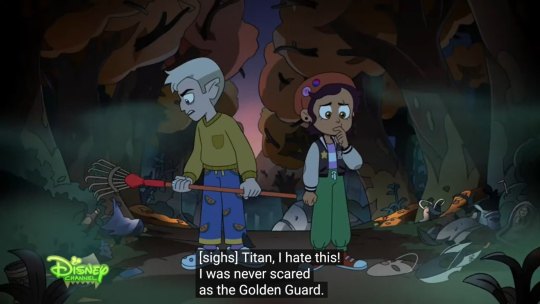
and then... the crying scene. i am not exaggerating when i say this is SUCH an important moment for hunter's character, as well as a perfect insight into his dynamic with luz. especially since the thing that jumpstarted his cry was luz telling him he's family now, and that she wants to ensure he's safe too... all his emotions coming to the surface, him finally not managing to keep stuff in, allowing himself to be vulnerable like that next to someone, actually crying and letting it out instead of holding it in or distancing himself in order to go through it alone... it was a big step for him, and it perfectly illustrated just how much he's grown.
and the way luz responded to it was also so thoughtful. she was extremely tired and depressed herself, but she still showed worry. she knew hunter needed space to let it all out and avoided crowding him, since jumping at him with worry and questions and hugs would only make it worse and freak him out, but she initiated a delicate half-hug after a moment, non-verbally expressing her care.
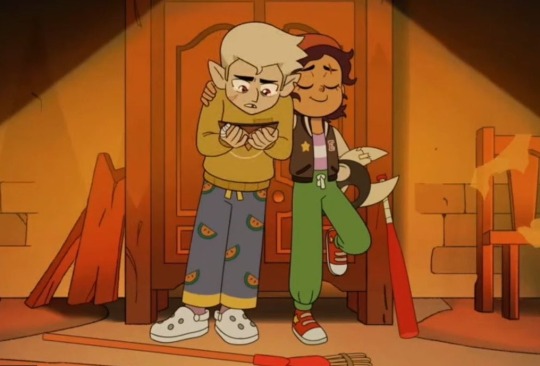
but moving on!
now, let's focus on hunter post-flapjack's death.
it's a big, traumatic event that affects and shakes him a LOT. he doesn't feel good, he doesn't feel happy, and that predictably results in the same thing as always..... hunter repressing his negative feelings and masking them as anger. prioritizing helping others and focusing on a mission at hand. not being sure if he's okay or how he feels or how to express what he feels when someone asks.
this is the behaviour we've ALWAYS seen from him in such situations. in season 2a, when he's just generally unhappy even if he doesn't realize it, and appears as angry and irritable... and in labyrinth runners, when he lives alone while dealing with serious life events; distances himself from everything and everyone, and then tries to act as if nothing had happened, and isn't sure HOW to express/talk abt his feelings, prefers to focus on someone/something else instead. andddd at the end of thanks to them after flapjack's death! when he immediately asks if everyone else is okay and jumps in to comfort luz and focuses on taking belos down; on a task. JUST... AUGHH! he prefers to push through his feelings cuz it's a defense mechanism, the same one he's been using in the past; in the coven. it allowed him to survive, and such instinct is not something that's easy to abandon.
so, this entire pattern is so, so clear in how he acts in for the future too. he tries to mask his grief and sadness with anger and coldness. he keeps pushing people (and palismen) away, distancing himself from others, acting irritable, focusing solely on the mission at hand, just wanting to find belos immediately; thinking about literally anything but flapjack or what happened just a few hours prior, cuz it hurts too much to think about it. the sadness and other emotions that accompany him as a result of flapjack's death keep sneaking up on him in random moments, but he fights not to let them through fully. he cannot allow himself to break down right now.
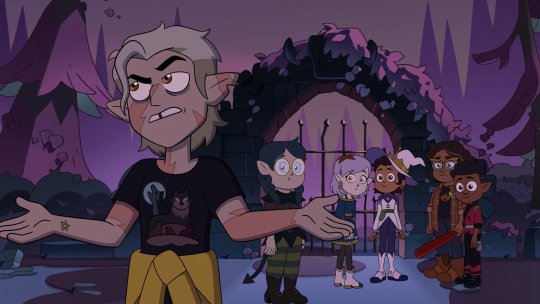
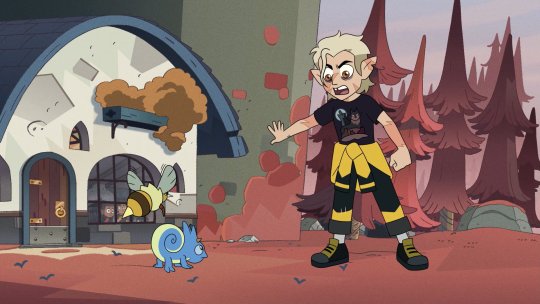
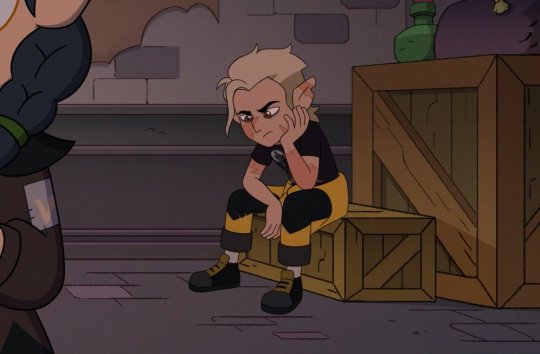
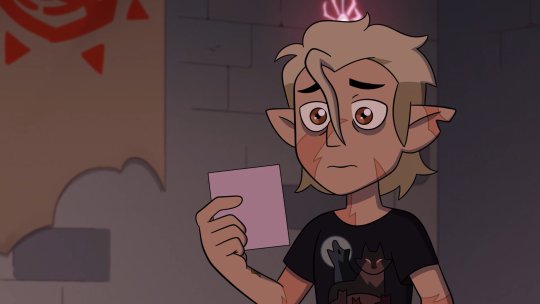
but then, he's alone for a moment, and he allows himself to feel some vulnerability here. he's overwhelmed by what's happening and misses flapjack. and, as always, he doesn't know what to say. he feels everything so intensely inside but he has no idea how to express that on the outside, he doesn't know how to put everything that he thinks and feels into proper words; how to accurately communicate everything he wants to communicate to gus and willow. he struggles with that.
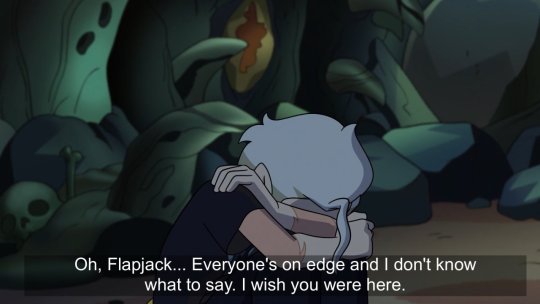
but just like willow had her arc of repression (to be talked about in a second) and finally realized she can rely on other people too and allowed herself to show feelings and vulnerability instead of letting it all consume her from the inside out, hunter similarly let himself show some of that vulnerability to his friends. in the span of that moment, driven by pure instinct and his love for his friends, he managed to put what he'd always wanted to say into words.
he also realized that flapjack is always going to be a part of him in a way (both literally and metaphorically), even when he's not actually there, and it brought him some comfort at last... it didn't heal him or got rid of his grief ofc, there's a long journey ahead of him, but it helped him with the first step of dealing with grief and accepting what had happened.


now, when we compare how he is with feelings right now to how he was at the beginning of the series, he's truly grown so much. he's always gonna somewhat struggle with expressing his emotions and vulnerability, but now that he's surrounded by people who care about him, whom he trusts with his life, who he doesn't fear being vulnerable around, it's going to be so much easier for him. of course, there are always going to be instances where something bad happens and he represses again; his defense mechanism and trauma response aren't going to just instantly disappear like that. but he has people he can be his true self around now, people he can confide in; it's going to help him a lot. and he's going to continue growing, and developing as a person.
.....yeah! okay, now... willow time!!
willow's repression arc has always been always kinda sprinkled in and hinted at throughout the duration of the series. we know she was bullied for a significant amount of time and it affected her confidence a lot, but it also made her repress and push down her feelings.

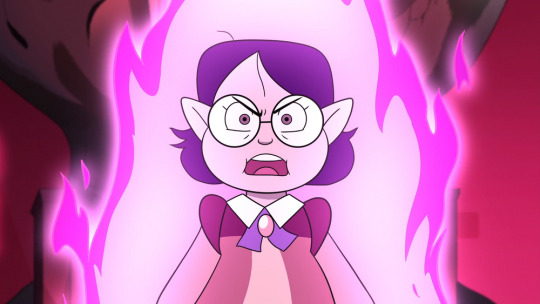
i'd say her arc almost had... two parts to it. the first one was her coming out of her shell, gaining confidence and embracing her strength. the second one: her struggle with vulnerability and repressing feelings.
meeting luz and transferring to plant track was what definitely helped her with the confidence problem. she flourished (lol) after she was allowed to embrace her interests and strengths. but what remained, was that willow saw her insecurity and emotions as her weaknesses. she even said it herself, she most of all wants to protect everyone she loves (similar to hunter actually), and all-together that resulted in her shutting herself off and just focusing on others' feelings. wanting to be reliable for her friends, seeing herself as the "strong one" in the group; the rock. the mature one.
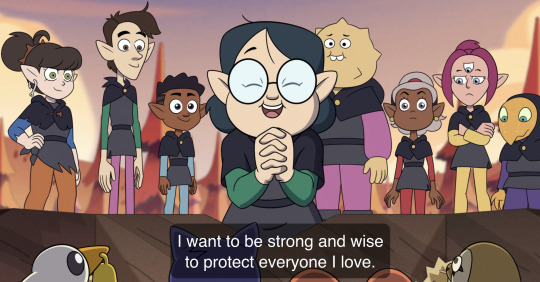
always pretending she's okay and fine with everything, putting a smile on her face through it all. because after all, she doesn't want others to worry about her, right? (she did it for all emotions too, basically)
especially if we take into account that she was bullied and seen as inferior to others for years + her entire past with amity + just in general her history with the abomination track and the expectations from her dads regarding it, all of it was trauma for willow and she ended up with the need to hide her feelings (something she saw as her weakness/flaws/weak spots) as a coping mechanism. she hated being seen as weak, and after she gained more confidence in herself, that feeling only grew.
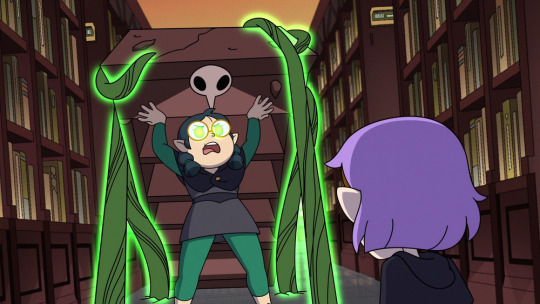
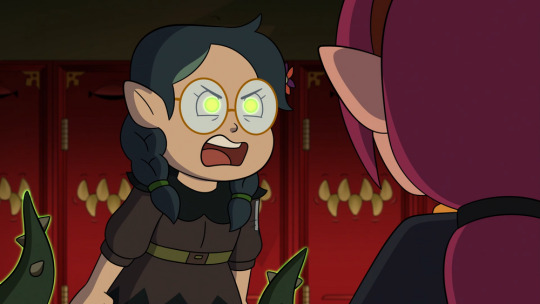
in for the future, we could see just how much the suppression was affecting her. she still tried to be cheerful, dependable, not bothering anyone with her own worries, trying to make others feel better. but with each next moment, every feeling of hers builds up more and more, until finally it cannot be contained anymore. and explodes.
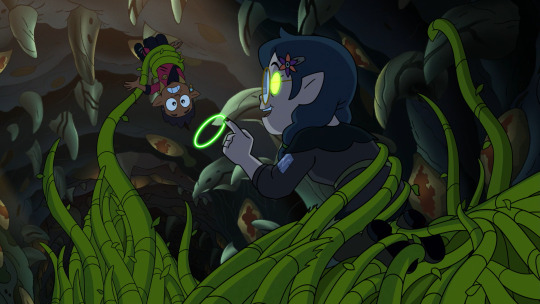
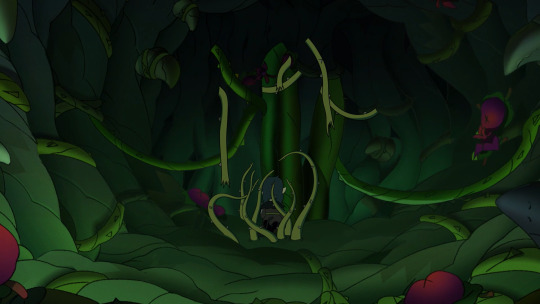
her magic is actually also a great metaphor/illustration of her feelings suppression. whenever willow's especially feeling things, we can always see how her magic reacts too it, how her emotions manifest through it. and this scene in ftf is a great visual representation of it; how the vines slowly cover her until she's completely buried under them. how helpless she feels. man...
but at last, she allows herself to let her feelings out. she's assured that she's not any worse for it, told that reliable people can rely on others as well. she lets all her worries and fears and thoughts and vulnerability finally show, instead of letting it all consume her from the inside out. it's such a turning moment for her. because from then on, she's shown to genuinely express more emotions and not depend entirely on herself, now that she's aware it doesn't make her any less strong. she's assured none of her friends are gonna think any less of her, or to see her as weak, and that's good.
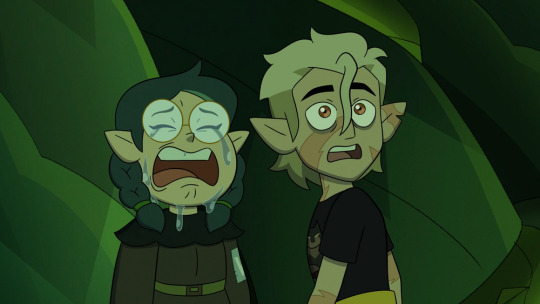
actually, another thing i wanna bring up is willow being saved and bridal-carried by hunter in this scene.
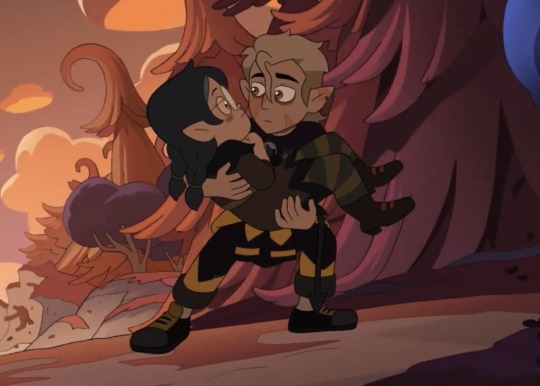
could she have saved herself? yes, most likely, just like she did in any sport in a storm, when she was still suppressing any weaknesses of hers and relying on herself only. if hunter hadn't teleported to save her, she'd probably do just that. but this little moment is actually such a good illustration of how now that she's allowing herself to depend on others too (instead of just be dependable), she allows herself to be saved. when she needs it.
see, this is actually the thing i've seen lots of people confused about because "willow is independent, she wouldn't want to be saved" and... that actually confuses me, because it truly misses the very core of her character arc.
the point is that she CAN take care of herself and she wants others (especially people who see her as weak) to know that and to not underestimate her abilities (just like we've seen in labyrinth runners, for example). but, at the same time, she also wasn't allowing herself to take her guard off or to be saved by others for a long time exactly for that same reason; because she didn't want to be seen as weak anymore. she wanted to be seen as only strong and independent, to the point where she deemed any weakness of hers as bad.
like, that's the entire point of her character, her repressing negative feelings then finally allowing herself to open up and be more vulnerable (+ realizing it doesn't make her any less strong). she doesn't hate being saved necessarily, she hates being seen as inferior and weak and incompetent. for example, willow hated when amity constantly tried to save her in labyrinth runners instead of letting her take care of things herself or acknowledging her strengths because it made her think amity thought she was not capable of protecting herself. because it was amity saving her from the smallest things. it made her feel disrespected, as if she was called weak right to her face.
now... hunter never saw willow as weak, ever, and he knows perfectly well that she can take care of herself. he respects her and likes her in her entirety, both for her strength as well as her softer, more vulnerable side. BUT in moments when he thinks she does need protecting or saving, he doesn't hesitate to do so. and now that willow has let herself be more vulnerable and realized she can let herself rely on others more, she clearly appreciates and doesn't mind it whatsoever.
the mutual trust and respect is the actual key point in hunter and willow's relationship; they both know each of them are strong and skilled and able to protect themselves, but they also know each others' vulnerabilities and want to protect each other when a situation actually calls for it.
both willow and hunter want the ppl they care abt (each other included) to be safe and they will protect them when they need it, but neither of them would like... completely discredit someone's abilities to stay safe on their own. so when it comes to willow's strength complex, hunter knows when willow can take it cuz he respects her and trusts her abilities, but when she actually needs it, he'll gladly save and protect her as his priority; but not in frivolous instances when she can take care of herself. and she will do the same for him.
so yeah!
tldr; it's actually super cool how both willow and hunter repress their feelings a lot and prioritize others over themselves but it manifests in such different ways and comes from slightly different circumstances/reasonings for each of them.
willow more-so feels like she has to be the more mature one in the group, and she pretends she's okay and fine and focuses on how others are feeling instead of herself cuz she wants to be dependable and hates showing weakness or being seen as weak.
whereas, hunter isn't sure how to express himself and when he feels negative things, they manifest as anger/irratibility. he prefers to focus on some productive task instead and he prefers to distance himself from others, and it also all comes down to how he grew up in the coven and how he was raised by belos. like it's... SO interesting how they both do something so similar at its core but so differently.
#i don't have a phd in willow's character though so i can't write as much abt her as i can abt hunter kxjsk but yEA... it's all so neat to me#toh#the owl house#my toh talk#hunter#willow#nicole answers#Anonymous
538 notes
·
View notes
Text
One thing that is actually super interesting - character wise is how stark the difference between Angel and Angelus is when compared to Spike and be-souled Spike.
Angelus and Angel might as well be two completely different people - the way they act, react and conceptualise the world around them is honestly completely opposite.
Meanwhile, besouled Spike is a lot more aware of his past actions and isn't interested in killing humans for sport etc, but in the way he interacts with the world around him, he's actually still very similar - he's snarky and sarcastic, romantic yet cynical etc.
It's extra funny when you consider that probably this was never supposed to be a Deep Philosophical Ponderance Of The Nature Of A Soul
In my opinion this came out of happenstance: a writing choice forced on the Buffy team, based on when in the narrative it happened.
Angelus was always set up to be this enormous threat, this absolute monster tormenting Buffy, while Angel was supposed to be this fairytale first romance of a wonderful older boyfriend - the dichotomy was probably decided upon before /in season 1.
Spike on the other hand was never planned to get a soul - he wasn't even supposed to stick around longer than the 2nd season! However, the ensoulment made sense with the progression of the story/character if the writers wanted to adhere to the rules of the universe they set up namely:
Vampires are Evil Demons, inhabiting the body of the human before them, and most importantly they are irredeemable and incapable of true human affection. This is extremely important lore in that universe, because Buffy kills a lot of vampires - in the later seasons they aren't even really a major threat and more background ash. If you suddenly introduce the idea that Actually vampires can be fully redeemed, your main characters has been just murdering Possibly Good People willy-nilly for several seasons
Unfortunately, at this point in the narrative, Spike might as well have been ensouled already - he was acting altruistically, out of love (self-reported) and was mostly just helping our heroes, with motivations unrelated to villainous impulses
So really the writers had to give him a motivation to go and get his soul (the writing choices on how he gets there Being Bad notwithstanding).
HOWEVER, they really really couldn't pull the same move with Spike that they did with Angel re: his 180 degree personality switch simply because the audience liked non-soul Spike. They enjoyed the personality and character that had been crafted for the last 5 seasons, so changing him too much would have with almost complete certainty been met with negative reactions .
Which is why I assume they decided to simply soften parts of his personality, make him stop wanting to kill humans and called it a day on his other less-than-cuddly personality traits.
Which leads us to question on why two people in the same circumstances turned out so wildly different ESPECIALLY since William seemed Basically Alright when he's human.
Does that mean that Angel is fundamentally a worse person, only held back by the morality of his soul? Or that he was fundamentally a much more virtuous man and therefore the loss of his goodness had a larger impact, as removing those parts took away more of what he used to be?
That William was a lot more acerbic and mean deep down and therefore not too different? Or that actually William lost way less of his morality/capacity for empathy when he turned because Something and that led him to doing less awful things that would lead to a personality change??
Those are such interesting questions that somehow the show never addresses (as far as I know? comics people?) aside from Angel Being Mad that Spike got over his angst so quickly and it's just hilarious to me that if I'm right this basically was never meant to be that deep and simply just a byproduct of What The Fuck To Do With Spike
#buffy the vampire slayer#btvs#angel btvs#spike#angelus#if I want to be screamed at I'll write another way too long post on why I hate That S6 Ending writing wise#and no it's not because I ship Spuffy and don't like Spike Being Evil - it's because that was fucking weak as shit writing#but what do you expect from whedon#he fully lucked out on getting a character like Spike to happen but instead of thanking his lucky stars he resented it ever since
67 notes
·
View notes
Note
hello!
I've seen your hypnoshades callie stuff alot on my feed, and I just kinda had a question for ya.
if the hypnoshades were, indeed, a metaphor for drug abuse by celebrities...would that not make Octavio an enabler, as he allowed Callie to utilise the hypnoshades (and most likely aided in the creation of them) ??
(this does not make Octavio a totally irredeemable bad person, at least not in my opinion. Perhaps it's the only way he knows that he can help Callie, maybe . It's just something that I've noticed that's never really been brought up in the other stuff that you've written).
Okay.... here's the thing about the hypnoshades. it's pretty obvious that Splatoon 2 in someway was rushed and that includes the story mode. It came out 2 years after Splatoon 1 and it launched with not a lot of content. Unlike something like Octo Expansion or ROTM where there is lots of explanations on things and how things work, in Splatoon 2 there isn't that and it's incredibly rushed. We don't fully know the circumstances of what happened to Callie and how Octavio gave her the shades, all we know is that Callie was like "ok fine I'll hear you out" and joined the Octarians cause of reasons I've said a trillion times lmao.
Octavio for sure did some bad shit let's not kid ourselves. He is the antagonist and he's not gonna be all sunshine and rainbows. In some way yeah he enabled Callie to use the shades and therefore she ended up getting addicted to them. Her rematch dialogue in other languages shows that Callie is attached to the shades and is a bad coping mechanism for her because well... She's still doing the acting gig and it's still hurting her.





Heck even Marie in the Russian translation says "why are you so attached to those stupid glasses? Callie, those glasses are only getting in your way!"
However this addiction is actually kinda treated like a joke and makes Callie seem more like an idiot and that.... pisses me the fuck off to no end. I get that Splatoon is silly but this is just near character assassination to me tbh.... Especially how the community treated her in that time.... But i digress.
I still don't think that Octavio is some vile monster that abused Callie in some way shape or form. He treated her as best as he could in that scenario, he didn't restrain her, he didn't force her into anything. He let her decorate bases and do other things because it helped boost the morale of the Octarians, hell the Octarians got inspired by her and made music with her vocals and stuff like that.
I truly believe that the hypnoshades are just that, hypnosis shades. Octavio probably made them for Callie so that she's less likely to just suddenly run off, which is still fucking bad mind you. Callie was willing to stay and yet Octavio was like "just in case....." But here's the thing also, hypnosis isn't mind control and you can't brainwash people with them. The term "brainwashing" is only found in the English translation of the Japanese script and so far we don't have retranslation of the original script and I'm not gonna fully trust the English translation. As a Sonic the Hedgehog fan, i know that some English translations can fuck up important details and completely change the tone of the story so easily lol.
Octavio is more of a caring person than he is not. He has been shown that he does care for troops but he's just a little bossy towards them and he has to be because his race is on the brink of collapse. He has to make these quick and bad decisions to save his people. When his people got kidnapped by Mr. Grizz, he immediately went looking for them and wanted to get revenge. And when he finds out Mr. Grizz did it, he drops his hatred for the New Squidbeak Splatoon and helps them out. His people are his top priority.
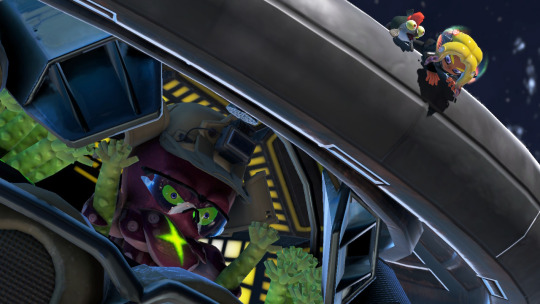
Hell if you want the ultimate proof that Octavio isn't the worst person in the world, Callie went with him to the Low Water Party after Octo Expansion, Octavio would not bring a hypnotized Callie that was missing during the events of Splatoon 2 to a fucking rave party, everyone would get his ass lol. So yeah, a Callie not under the influence of any shades went "yeah I'll rave with you!!!!"
She even smiled when Octavio came down to rescue Neo Agent 3 when everyone else was shocked, if that doesn't scream that they are good terms then i don't know what will.

Sorry if this seemed very rambly, when people talk about Hypno/ Octo Callie in any form i lock THE FUCK IN lol!
#splatoon#splatoon 2#callie cuttlefish#callie splatoon#dj octavio#octo canyon#ask me stuff#ask blog#splatoon 3#ask me anything#ask#ramblings#long post
43 notes
·
View notes
Text
Stop Defending Ableists Challenge (Level: Impossible)
So the other day I made a post listing all the ableist things Jacob Richmond has included in Legoland and Ride the Cyclone.
And the response was abysmal - the amount of "well actually..." kind of responses I got was disgusting and I took down the post because I find it counterproductive to argue with teenagers on the internet. However, I stand by the belief that if you think you are old enough to post publicly on the internet, you are old enough to be held accountable for what you post.
But I think what I had to say was quite important, so I am going to reword it here.
TW here for the discussion of ableism and ableist slurs (they are all censored)
There is ZERO (0) justification for the use of THREE (3) ableist slurs across both works. I don't fucking care if it was the 2000's. The ADA predates both shows and disability activism had existed for decades before that (as yannick very kindly reminded me). So no, it was not ok for Richmond to use those slurs in his works, regardless of the time period. Because there is nothing "correct" (politically, or otherwise) about ableism.
And before you say "Oh, but it was the character who said it, not the writer..."
CHARACTERS ARE NOT SENTIENT BEINGS! They are not created in a vacuum. Their thoughts and actions are often a reflection of the author's own beliefs and morals.
It was not Ocean who decided to use the word cr*pple. It was Jacob Richmond who decided to use it. Same with the r word and sp*z in Legoland. It wasn't Penny and Ezra who decided to use those words, it was Jacob Richmond. Because each character's actions are dictated by the decisions that the author makes for that character. And in this case, the author decided to be an ableist asshole.
Yes, characters can be assholes. They can be complex and nuanced beings. But there are better ways to portray such experiences than being violently ableist (i.e.: without using slurs). And why does the ableist character get complexity and nuance, but the disabled character is simply the sad, disabled kid, with not much else in his personality until he magically becomes abled bodied. Like we deserve nuance and complexity as well, people!
In a 2022 interview with Curtain Call Bway (here), when asked who his favourite character to write was, Richmond responds with the following:
Ocean is definitely my favorite character to write because it’s based on certain people I’ve met and certain aspects of myself too.
Like he literally admits it himself, that his decisions when writing an ableist character were based off aspects of his own personality.
The reality is, disability has never been more than a comedic plot point to Richmond. He has never cared about portraying a realistic disabled experience. He has never cared about disabled people.
And the cherry on top is that his response to yannick-robin being hate-crimed was to rewrite Ricky so that he could be played by an abled and therefore production teams wouldn't have to give a shit about ensuring their spaces are safe and accessible for disabled performers. If he actually cared about disabled people and properly representing our experiences, he would have worked with a disability consultant and fixed the issues within the show. Instead, he doubles down and causes even more harm.
To add insult to injury, he then licensed that script to Sarah Rasmussen and her team of ableist cronies for the DC production. Because him choosing to continue working with Rasmussen and her team just shows that he shares the same ableist values as the McCarter/Arena team.
So by saying that "its the character, not the author", you are defending Richmond and his violent ableism. You are attempting to justify the harm he has done and CONTINUES TO DO to disabled people. YOU. ARE. A. PART. OF. THE. PROBLEM.
Ride the Cyclone and Legoland (in ALL its forms and versions) contains so much ableist violence. This violence has traumatised REAL PEOPLE, but yannick, myself, and other people speaking out are the ones ruining the vibe by calling it out? Be fucking for real people.
Now if only my university papers were this thorough...
#ride the cyclone is ableist idk why y'all still worship it lol#stop defending ableism#if this shitshow goes to bway that will be my 13th reason lmao#ride the cyclone#constance rtc#jane rtc#mischa rtc#noel rtc#ocean rtc#penny lamb#rtc musical#disability#fuck ableism#ricky potts#jane doe rtc#noel gruber#rtc fanart#rtc#mischa bachinski#ride the cyclone edit#ride the cyclone fanfiction#ride the cyclone fanart#jane doe ride the cyclone#jane doe#monique gibeau#station theater#trinity theatre rtc#trinity theatre ride the cyclone#constance blackwood
196 notes
·
View notes
Text
Patton Sanders Analysis
Taglist: @januscorner @pandagobrr @icycove @cutebisexualmess @oatmeal-stans-the-trash-rat
@part-time-zombie
Post Under the Read More, it is long!
This is an analysis of Patton Sanders. Putting this here right now, I relate to Patton Sanders a lot. This is of the official episodes, and not the Asides!
Patton Sanders is Thomas’s morality and emotions.
Very important distinction is that he is Thomas’s morality not The Morality. He is not the arbiter of right and wrong, he is the aspect of Thomas that was raised a certain way to believe that certain things were right or wrong.
Within the first episode, Patton is acting as Morality first. This is important because that’s how he always seems to act as first. He always tries to be Morality and then emotions. However, this is not beneficial.
In the first episode he asks Thomas, “What positive impacts do you inevitably hope to bring to this world?”
Thomas is surprised by this, as it seems that Morality is more of a comic relief character in the beginning in his eyes. While probably due to the fact that the series was not initially supposed to be more than a few episodes long iirc, it can also be taken another way. It’s a way to show that Patton is smarter, and does think a lot deeper than how he appears to. Because he’s always trying to be happy (as happy is a good emotion. We’ll get into emotions and morality in a bit). However, when Thomas notes that it is surprising for Patton to say something like that, Patton points to his and Logan’s glasses, noticing that they’re the same.
Why does he do this? What could he possibly gain from doing this? I believe this is because he doesn’t wish to be seen as the deep philosophical side, but as the Happy Pappy Patton (something he says in a later episode). Being deep like this could effect how the other sides see him, and (like all the sides) doesn’t want to be seen that way.
There are a few other things to note in the first episode, when talking about his flaws, Patton says, “you can be a bit selfish with your food and your other belongings.” Which is notably something that Thomas does, but in the section where they talk about his good attributes, the moral side states “you believe there’s good in everyone,” which is something that Thomas thinks. And it’s our first clue to just how hard on Thomas, and himself, that Patton really is. If you can say something you’re doing wrong morally but can’t say an action that you’re taking to do something correct, it begs the question, how hard are you one yourself?
Morality is learned, it is not something you’re born just knowing right off the bat. This is important, because it’s important to keep in mind that Patton’s views are Thomas’s views on morality.
In A New Year of Lying to Myself… In Song!!! Morality and Logic butt heads, Patton is attempting to use his sway over Thomas to have him learn to cook more, while Logan wants him to learn something new. Patton doesn’t seem to quite believe it when Logan tells him that Thomas has “cooked in the kitchen plenty of times” since the WAY TOO ADULT (way too adult), and asks for proof. And I’m struck with why, since Thomas is them wouldn’t Patton be able to see Thomas cooking? While Logan is Logic and contains information Thomas learns, like cooking (therefore it making sense that Logan would be perhaps a little more aware than Patton), Patton is at the forefront of Thomas’s morality. And he had deemed it morally good for Thomas to cook. It would be completely reasonable to assume that Patton would be aware of that. Unless the only reason he deemed it morally correct is because, and I’m quoting to the best of my ability since this is said when Roman, Patton, and Logan are speaking over each other, “The basic essential things, that you need to learn to seriously become an adult to succeed at adulting.” (Again, very much trying to hear what he was saying in order to get this quote, I may be slightly off on what he said). Based on this, he views it as something everyone who is an adult does and knows how to do. Which very much reminds me of how neurodivergents like myself mask. We don’t know how to do something and so we’re hard on ourselves for not being able to do it, yet it’s something that otherwise isn’t important to us or how we function. I think this is Patton’s views on Thomas cooking. He believes it essential to how Thomas can take care of and survive on his own, which is why it’s morally correct to learn, however it isn’t actually something he deems important enough to pay attention to.
Also Patton already has an aversion to lying in this episode. He doesn’t try to seem positive and upbeat in this, or attempt to be gracious to Thomas about New Years goals. He just agrees, not wanting to lie as that’s wrong but not seeing anything positive he could say in Thomas’s defence (which again, leads me to believe he is extremely hard on Thomas and in turn himself. This is corroborated in other episodes as well).
Thankfully Logic, Morality, and Princey reach an agreement of small goals that Thomas could make in that episode. (Which solves that episode’s problems, but not Thomas’s of being hard on himself, this is something I hope to revisit.)
One of the first times Patton encourages Roman, from what I’ve seen, is in I’M IN A DISNEY SHOW!! (I’m in a disney show!!) This is because Roman is excited about the fact that Thomas was in a disney show, despite being there himself. He was achieving his hopes and dreams, and Roman was excited. Virgil tells him “You were there… princey, we’re both factors of his personality.” This prompts Patton to tell Anxiety to let Roman express his emotions. While I agree with the sentiment, I think this is the first we see of the sense of emotions and morality feed into the ego. Which will end up being a problem (As we will discuss later in this essay).
Patton then proceeds to tell Thomas that “I just want to support you in everything you do. Plus I saw you had some leftover pizza?” While I completely believe the sentiment of that first statement is true, by saying he wants pizza right after he is undermining that first statement. And I think that’s because he only cares to the point of where Thomas is happy when it comes to Thomas’s hopes and dreams. (This is because he Morality and Emotions, this is Not because he Unsympathetic, I want to make this clear. While I am being critical of Patton, I am in no way shape or form calling him unsympathetic!) This interaction is proof that while Patton wants Thomas to be happy and morally in the right when it comes to how he’s happy he doesn’t seem to care.
In The MIND vs. The HEART (The Mind vs. The Heart) is when we get the confirmation that Morality is also deeper emotions and empathy.
I think that this bit of diologue from Thomas himself illustrates Patton’s constant struggle. “Dad guy. You encourage me to do what’s right and strive to do the most good in this world that I possibly can. And I appreciate that. But a lot of times I spread myself too thin. I also tend to make others a priority over me, and their feelings a priority over mine.” Patton is Morality, he has learned to put other’s emotions over his own. He has learned to put other people before him.
Another problem I believe Patton to have is not listening to others because he believes himself to always be in the right. He is morality after all, he knows what he’s doing, he believes that his default is to be good so therefore he is good. So in a lot of the videos, whenever he’s not specifically addressed, or has some sort of stake in it he tends to go off and do his own thing. If Thomas isn’t feeling bad, and if he isn’t doing something that is deemed morally wrong by Patton, then what is Patton supposed to do.
However, as seen in all of this, he is also Thomas’s emotions. He is not just how Thomas views right and wrong, but how he feels in each and every situation. Having to handle not only what’s right and wrong, but Thomas’s emotions is a hard job. But it’s the job he has. And he can’t be wrong, because if he’s wrong, if he’s in the wrong. Then Thomas is, and then Thomas is a bad person, in Pattons point of view. While one of Patton’s fears might be spiders, I believe an even greater one is if he was wrong the whole time, if because he was wrong and Thomas was wrong, that he led Thomas to be a bad person. And this is only really brought to the front by Janus. While the others tell Patton he’s being too hard on Thomas, Janus shows it in the form of Frog Patton hurting Thomas. I think one of the reasons it’s so hard for Patton to understand this is because he doesn’t want to be anything other than Thomas’s Happy Pappy Patton. Nothing more than the morality and positive emotions that keep Thomas upbeat. If he’s anything other than that then he believes he’s failed as a side. He solves the tinier problems without addressing the bigger ones because he didn’t understand what exactly he was doing wrong.
Yes, he had been told he was being overbearing, spreading Thomas too thin. But he was never told how detrimental that was, how wrong for Thomas it was. He just knew that he and Logan butted heads about it a lot because of Thomas’s schedule. After all, he can’t be wrong, he’s the moral side, the side that knows right and wrong. And Roman, Virgil, and Logan all enhance this idea so much! In Growing Up, they tell Patton to stick to knowing the difference between right and wrong, and then go and ask him for help. They consistently tear Patton down to Just Morality or Just Emotions depending on the video. And at the beginning of the series they barely listen to him as is. I think this fundamentally changes in both MOVING ON (Moving On) parts 1 and 2. This is where they start to realize he’s not just Morality or Happy Emotions. But Morality and All of Thomas’s Emotions in general.
“I feel guilty for still feeling this way for so long.” Patton doesn’t like feeling horrible, especially not for long periods of time. Possibly because he’s been taught that negative emotions are bad, possibly because it makes Thomas feel bad and he feels guilty. But with him being Morality as well… It makes it so that negative emotions feed into the Thomas Is Doing Something Wrong complex, meaning he has to figure out what’s going on and sort that out while dealing with, you guessed it, emotions! It’s a loop, a repeating pattern of events that he doesn’t know how to stop, and It Is Of My Opinion that that is because while Morality is something learned, after a while it feels like something that is engrained into your being.
There is also a habit of whenever Roman is feeling down or bruised of Patton going to and helping him. Which isn’t necessarily bad, however we don’t see the other sides do this nearly as often. In Am I ORIGINAL? (Am I Original?) Patton is the first to reassure Roman that content doesn’t have to be original, after Thomas tells him that he could never disappoint him. And then, in the very next episode, Patton is the only one reassuring Princey after his ego has been bruised. And I think this really sets up a sideline of Patton being there for Roman and helping him out, which makes Roman really rely on him a lot. This is also emphasized in The Sanders Sides 12 SIDES OF CHRISTMAS (The Sanders Sides 12 Sides Of Christmas), when all the sides are getting onto Roman’s song lyric for Virgil, and Patton has to be the one to tell all of them to be nice to the princely side. (Janus also uses this fact in Can Lying Be Good, to try to get Roman to side with him). Now this isn’t necessarily a bad thing, but if your source of ego is getting fed by only one facet of your personality that can end up being a devastating blow when that part is proven to be faulty or wrong.
While there have been attempts to reign Patton in, I don’t think he fully understood that how hard he was being on Thomas was ultimately harming him. As none of them were nearly bad as the events that transpired to get us to the Selfishness vs Selflessness and Putting Other’s First. “Roman I thought you fought for honor? Why are you pushing Thomas to be dishonest?” This is what Patton says to Roman about possibly lying to his friend’s to go to the callback. This seems inconsequential, but I wonder if Roman would have made the same decision had Patton not said that. In Putting Other’s First, Janus and Patton butt heads, arguing about Morality and Why People Should Do Things. And Roman takes Patton’s side. I think this is due to the fact that while he knew Thomas wouldn’t be happy at the wedding, he also ‘knew’ that it was the right thing to do because Patton is (Thomas’s) Morality, and Patton has to be right about this. Not only that but Patton has been there for him time and time again and he wanted to return the favor. Be a prince.
Yet Patton learned, by turning into a frog, that he was hurting Thomas. That while he might be doing what he believes to be Morally Correct, because of his actions, his beliefs, Thomas was being hurt. And he realized that what Janus was saying was true, and he was able to visualize just how badly he was hurting Thomas. But with how it ended up going down, it came at the expense of hurting Roman, of (I believe unintentionally) shattering the ego.
As per my first(not nearly as extensive) analysis, I said “Patton absolutely believes going to the wedding was the correct choice, but Thomas had been excited to be fulfilling his dreams of being an actor. And so the excitement of his friends getting married was dampened by the fact that he missed out on what could’ve been a dream job. And not only that, but now because Thomas is bummed about missing this opportunity, Patton feels guilty about the disappointment, because his friends are getting married and he should be happy and even excited about it. But he isn’t. And so, while morally Thomas did the right thing(according to Patton), because he isn’t happy about what’s happened, that essentially traps Patton in this circle of guilt. Guilt for the choice that Thomas made not making Thomas happy; and guilt for being at Lee and Mary-Lee’s wedding to celebrate and not being ecstatic for them.”
#glacier rambles#patton sanders#sanders sides#sasi#ts sides#thomas sanders sides#ts patton#patton#patton sanders analysis
37 notes
·
View notes
Note
You have to love the hypocrisy of the show acting as though being a pimp is so much better than being a slave owner; like it isn't still human trafficking, and as though in that time and place, black women wouldn't have suffered the most from it. It's a seriously disgusting thing to pretend that it's this cutesy, morally fine thing to do: if they're fine with Louis being a sex trader, than they should have been fine with portraying the actual story of the books - he's meant to be a passively bad person. The story is about evil deserving empathy. It would be different if they used the fact that he's a pimp to explore the fact that he's always profited off of human lives and was passively evil in life, that would have been different (though that's exactly what the books do, so it still would have worked with the original story and then the show might have been good), but it was used as a way to make Louis a morally fine uwu baby. I fucking hate it. It's disgusting for the show runners to pretend sex trading is okay and doesn't harm people, it's dishonest to pretend the show is a discussion about the legacy of race in America without actually discussing the way in which black women suffered as a result of misogynoir and how they were sexualised and their sexual exploitation was ignored (but we all know how the show feels about black women given what they did to Claudia), and it's ridiculous to pretend that it's a gothic story when it veers away from the moral complexities inherent to the gothic genre. It's a poorly written, malicious, badly developed show with subpar actors, and I hate how popular it's become. It feel as though it's defiling the legacy of the books. And apparently Marius is a pimp now too. I hate even engaging with it, but I had to vent. I hope it gets cancelled as soon as possible and the fan base dies down, in the meantime, I'll try to enjoy the books and the circle of book fabs that remain here. Of which your blog is a wonderful example. Love to you, hate to AMC.
I absolutely agree with every single word lol. As a woman and as a iwtv fan i am disgusted by the treatment of women in this show, but apparently the show writers and the majority of audience don't care about women representation, neither black nor white. Also the fact that they portrayed the sex workers (in the few scenes where they appear) as 'relaxed' women that seem to have a friendly attitude towards Louis (who in this show possesses a strong ambition for business) is weird and gives to the viewer a distorted view of reality. The narrative focused a lot on the issue of racism, so why not showing briefly the suffering of black prostitutes? Because the male gaze doesn't want to recognize it? I don't know. And don't get me started on the other female characters.
What happened to Claudia was completely avoidable and unnecessary and still rj opted for this version and said that the r4pe was 'a horrible thing that happened to her, but it has toughened her up'. I guess it is a self-explanatory sentence. I can't even imagine how SA victims felt while hearing him say it. It completely downplays the trauma of SA and implies that women get something positive out of it. I felt that episode and the scene in one of the first episodes where Louis burns the tapes of the '70 interview (the book….) were disgustingly disrespectful towards Anne Rice and her fans.
Last year I got into a heated argument with some show fans on twitter because they kept reiterating that 'at least prostitution gives more freedom to women/people than slavery', 'louis is a good pimp, he treats his girls with respect', 'he defends the prostitutes from cruel men' , 'at least he didn't enslave my ancestors unlike book louis', it was annoying and i was astonished of reading all their statements, very misogynistic.
Regarding pimp Louis: not only this is a way to avoid probing into the character's psyche/moral (and not include one of the most important themes of the novel), but it is a way of de responsabilize (and deny) the past. Louis is a man of his time and, with an accurate work of writing, it would have made sense to contestualize his privileged position and explain what it meant for him to be in charge of a plantation, it would have been interesting to show what it meant to be a landowner and slave owner at the time and the consequences of his actions reflected on his slaves, maybe introducing some of them into the narrative in a more concrete way (or do the same with the pimp/brothel storyline in the show, because it's equally evil), since it is a topic basically not explored in the book. But the showrunner decided that nowadays one should not represent these issues on tv and you have to disregard the past. It is extremely hypocritical.
And it's awful that for this reason they chose another historical setting, changing century and not addressing the fact that there were just as many issues in 1910/20 as well; apparently for the writers the XX century was a historical period with minor social problems where no difficulties existed (aside from racism, it was pretty much the most prominent theme in s1). And I doubt that the reconstruction of the New Orleans society of the time is faithful lol (and where is the voodoo?). All this imo denotes great laziness in the writing.
And clearly this series does not belong to the gothic genre, it's more a teen drama. Beyond the surface level thrills, the gothic literature holds a profound mirror to the complexities of human psychology that here are totally absent. I also doubt that the show writers did extensive research on the figure of the vampire in literature.
We were all eagerly waiting for the cancellation of this garbage that is NOT iwtv/tvc and the immediate disappearance of the show fandom ahahah but unfortunately it has been renewed for s3 😔
Thank you for the compliments mwah! hugs!
22 notes
·
View notes
Note
speak on sadist arcade gannon 🗣️
I WILL SPEAK THANK YOU!
arcade is such a fun character. i’m going to start off with a little bit of how i view him, and then go into more of the original post!
arcade is often written as he portrays himself, asocial and boring. or worse, he’s made to be this anxious, unsure, annoying gay-man stereotype.
but arcade is smart, he’s witty, he enjoys snarky banter and cursing in latin. at the end of the day, arcade needs someone who can keep up with him. someone who can get those gears turning in his brain. arcade values knowledge like no other.
there’s always something to be learned, even with a low int. courier. (my original post was a joke about this, he’s a sadist and following around an idiot in a post apocalyptic wasteland would definitely scratch that itch.)
however, no source of intimacy in his day to day life turned into learning as much as he can. he enjoys books on topics that are redundant to the world he lives in, because it makes him feel important.
being a person of medicine, he knows his way around sharp objects, he’s used to cutting clothes, he’s able to perform basic first aid. (…more on this in a minute.) arcade knows his way around the human body.
arcade was an only child, raised around enclave remnants can only offer so much. and while he hates to use the word lonely (“alone and lonely are two very different things, thank you.” he’d say.) he is clearly starved.
for attention and touch, on a level that means something more to him. i think one of arcade’s strongest points is his friendship with julie, there’s no doubt in my mind he loves her, that he values their bond. but she can’t offer what he’s looking for in this regard, and that’s okay.
arcade craves connection. he deflects anytime the subject is himself, because to him there’s safety in isolation. he’s met “several good men” in his life, but none of them stuck around. for how much he craves that connection, he doesn’t know how to do it. showing versus telling. arcade is honeyed words, but faraway in his actions. until six.
and it’s not that he wants to hurt, or own his partner, no. arcade hates the idea that someone could “belong” to him, HOWEVER; the idea of consuming someone is… special. arcade wants his and his partner’s heart on a silver platter so they can dine together.
i’m going to go through two different scenarios, but each have their own flavour of dialogue.
"I've got more experience dealing with egregious injuries than you think. I could fucking rip you apart, and put you back together again. I could even make that hurt, if you wanted. Do you understand me?"
in this excerpt, as composed as arcade is, he’s frantic. perhaps six is a self sacrificing idiot, consistently putting himself in harms way because he wants to protect his friends, arcade specifically. to arcade, he might as well be doing the damage himself. six gets cut pushing arcade out of the way? arcade can feel the knife in his hand. in this version, i picture arcade’s sadism is more emotionally charged/based.
"I've got more experience dealing with iniquitous injuries than you think. I could rip you apart, and put you back together again. I could make it all hurt. Do you understand me?"
this is the same idea, but a completely different tone. this time he’s offering, most likely based on an observation he’s already made of six’s self sacrificing behaviour. six wants a brush of death? arcade can offer that without a (serious) risk.
the change from ‘egregious’ to ‘iniquitous’ tells that the injuries go from generally bad to morally wrong. both are things he’s adept in. medicine or sadism.
all this being said, some fun ideas to consider. (nsfw!)
i want an arcade gannon who will cut through six’s last pair of pants without any remorse, maybe even a low chuckle.
featherlight touches with a scalpel or the carving knife he uses for cacti. dragging it down their tummy, down to their thighs.
an arcade who has a mean backhand, who then takes six’s chin in his hand and gives his head a shake like he’s a bad puppy.
an arcade who has six sit in his lap for hours as he works, laughs when they cry about wanting more.
arcade who will bite, arcade who scratches his partner’s hips.
arcade who lets six sit under his desk, pressing his foot to six’s cock as they suck him off.
37 notes
·
View notes